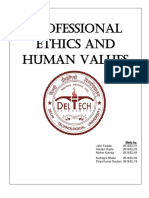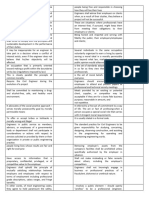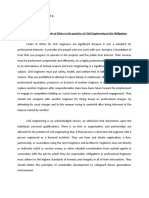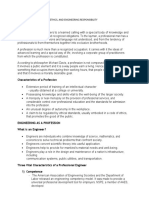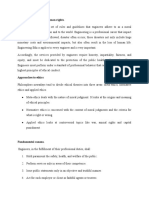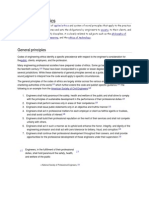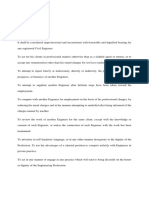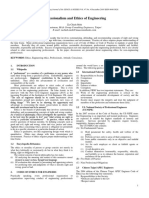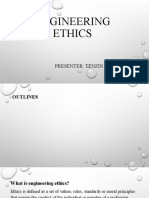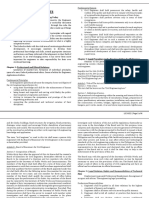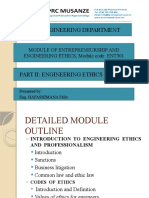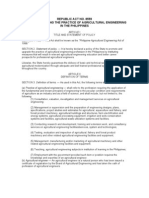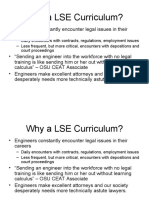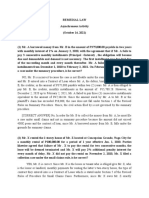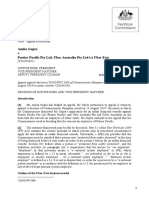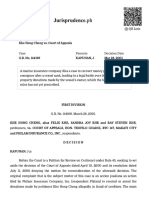I.
Agricultural Engineering Law
The first Agricultural Engineering Law was enacted by the Fifth Congress of the Philippines in
1964 and was embodied in Republic Act 3927.
In 1998, Republic Act 8559 otherwise known as the Philippine Agricultural Engineering Act of
1998 was enacted by the House of Representatives and the Senate. RA 8559 is a
consolidation of House Bill No. 10465 and Senate Bill No. 2393 and was finally passed and
enacted into law on February 13, 1998.The law aims to promote and upgrade the practice of
the profession by instituting measures that will result in relevant agricultural engineering
education and better career prospects for professional agricultural engineers.
The Rules and Regulations implementing RA 8559 were elaborated in Board Resolution No.
01, Series of 1998 of the Philippine Regulation Commission published in the Official Gazette:
Vol. 94 Manila, Philippines, August 3, 1998. No. 35 pages 6087 to 6096.
Pursuant to Article XI of the implementing rules and regulations of RA 8559, the Board of
Agricultural Engineering shall adopt and promulgate Code of Ethics and Professional
Standards for Agricultural Engineers.
II. Code of Ethics
Ethics is a branch of philosophy that defines what is good for the individual and the society
and establishes the nature of obligations, or duties, that people owe themselves and to one
another. The word ethics is derived from the Greek word ethos, which means "character,"
and from the Latin word mores, which means "customs." In modern society, it defines how
individuals, business professionals, and corporations choose to interact with one another.
The code of ethics is a written system of standards for ethical conduct. Since 1906 the
discussions of professional ethics have resulted into the various codes of ethics adopted by
many different societies. Although the Codes do not presume to define all of the duties and
obligations of an individual toward life, however, it could express as far and as clearly as
practicable the principles which should govern the professional relations of an agricultural
engineer to his client or employer, to the other professionals, and to the public.
�The Agricultural Engineering Code of Ethics
(Adopted from the Board of Agricultural Engineering, Philippine Regulation Commission)
Article 1. General Provisions
Registered Agricultural Engineers (RAEs) must adhere to a Code of Ethics and Professional
Standards, which provides for the maintenance of high standards and competence and
integrity. They must have a clear concept of, and the commitment to their obligations, to
their profession, to their clients or employers, to their colleagues in the profession and to the
public.
Section 1. Definition of Terms
Registered Agricultural Engineers – is a natural person who has issued a certificate of
registration by the Board of Agricultural Engineering and has taken an oath of profession
of agricultural engineers.
Client- the person or entity, which retains an agricultural engineer that engaged in the
practice of agricultural engineering for the performance of professional services.
Employer – the person or entity that employs and agricultural engineer for the rendition of
agricultural engineering and related services.
Enterprise – any person or entity whether organized for profit or not for which an agricultural
engineer renders professional services.
Firm – a proprietorship or professional partnership of two or more agricultural engineers or
persons engaged in the practice of agricultural engineering, including individual partners
thereof.
Code – a system of rules and regulations on any subject. It is an accepted way of behavior,
especially the mores of the society.
Competence – the relevant knowledge and skills applied to the standards of performance
expected in the workplace, includes the capacity to apply skills and knowledge to new
task in a range of environments (Regional Model Competency Program)
Integrity – the condition of having no part or element wanting; unbroken state; material
wholeness; completeness entirety. Moral soundness, probity, wholeness, completeness,
honesty and sincerity to perform work in its entirety in the quality or state of being
unimpaired.
Obligation – the action of binding oneself by oath, promise, or contract to do or forebear
something; a binding agreement which is enforceable by law, whereby a person or
persons become bound to payment of a sum of money or other performance; a binding
legal agreement or responsibility restricting power inherent to such an agreement or
responsibility.
Duties – obligations of behavior or conduct in relation to others and to GOD who have a
stronger claim on a person than his self interest the work someone is expected to do
because of his vocation or profession.
Ethics – the moral system of a particular school of thought, relating to morality of behavior.
The rules of conduct recognized in certain department of human life conforming to an
accepted standard of good behavior in the performance of a profession or trade.
�Standards – includes engineering practices, and the data adopted by the Philippine Society
of Agricultural Engineers (PSAE), Inc. and the Board of Agricultural Engineering. A model
to be followed or initiated established by custom and consent, a degree of quality, level
of achievement, etc. desirable and necessary for some purposes.
Article II. Responsibility and duty of Registered Agricultural Engineer (RAE)
Section 1. Every person admitted to the practice of agricultural engineering in the
Philippines as RAE shall endeavor to discharge duties and responsibilities with fidelity to the
public, his employer and clients, and with fairness and impartiality to all.
Section 2. They should uphold the honor and dignity of their profession and also avoid
connection with any enterprise of questionable character.
Section 3. It is their prime duty to interest self in public welfare, and to be ready to apply his
technical knowledge for the benefit of mankind.
Section 4. In their dealings with fellow engineers, he should be fair and tolerant.
Article III. Professional Life of a Registered Agricultural Engineer (RAE)
Section 1. Registered Agricultural Engineer (RAE) should endeavor to make effective the
agricultural engineering profession by interchanging information and experience with other
engineers and students and by contributing to the work of agricultural engineering societies,
schools, and the scientific and engineering press.
Section 2. Registered Agricultural Engineer (RAE) should not advertise his work or merit in
self - laudatory manner and he should avoid any conduct or practice likely to discredit and
do injury to the dignity and honor of his profession.
Section 3. Registered Agricultural Engineer (RAE) shall strive to continuously update and
enhance their professional knowledge, skills and competitiveness through rigorous research
and study, active and meaningful participation in continuing professional development
programs, seminars, workshops and conventions authorized by the National and/or Regional
Chapters of the Philippine Society of Agricultural Engineers (PSAE), Inc, an accredited
professional organization (APO), or educational institutions accredited and supervised by he
State through the Commission on Higher Education (CHED).
Article IV. Registered Agricultural Engineer’s (RAE) Relation with the Public
Section 1. Registered Agricultural Engineer should endeavor to disseminate public
knowledge of agricultural engineering, and discourage if not curb the spread of untrue,
unfair and exaggerated statements regarding agricultural engineering.
Section 2. Registered Agricultural Engineer should have direct responsibility for safeguarding
to the life and health of the public and employees who may be affected by their work for
which they are responsible.
Section 3. Registered Agricultural Engineer may express only such opinions as are founded
on adequate knowledge and honest conviction when serving as a witness before a court,
commission, or tribunal.
�Section 4. Registered Agricultural Engineer should not make ex-parte statements, criticism,
or opinions on matters connected with public policy which are inspired or paid for the private
interest, unless they indicates on whose behalf they are making the statement.
Section 5. Registered Agricultural Engineer should refrain from expressing publicly opinion
on any agricultural engineering subjects unless well informed as to the facts relating hereto.
Article V. Registered Agricultural Engineer’s Relation with Clients and Employers
Section 1. In professional matters, Registered Agricultural Engineers should act for each of
their clients or employers as faithful agent or trustee.
Section 2. Registered Agricultural Engineers should act with fairness and justice between
their clients or employers and the contractor when dealing in contracts.
Section 3. Registered Agricultural Engineers should make their positions clear to their clients
or employers before undertaking an engagement wherein they may be called upon to decide
on the use of inventions, apparatus, or any other thing in which they have interest.
Section 4. Registered Agricultural Engineers should guard against conditions that are
dangerous or threatening to life, limb, or property on work for which they are responsible, or
if they are not responsible, should promptly bring such conditions to the attention of those
responsible therefore.
Section 5. Registered Agricultural Engineers should point out clearly the consequences that
might possibly arise if deviations from their agricultural engineering work would be made or
if their opinions thereon would be overruled by non technical authority.
Section 6. Registered Agricultural Engineers may assist or advise their clients or employers
on matters pertaining to agricultural engineering and may cooperate with other experts and
specialists whenever their clients or employers’ interests will best be served by such service.
Section 7. Registered Agricultural Engineers should disclose NO INFORMATION concerning
the business affairs or technical processes of clients or employerS without their consent,
unless in obedience to a lawful order of a court.
Article VI. Registered Agricultural Engineers Relations with Fellow Engineers
and Allied Profession
Section 1. Registered Agricultural Engineers should endeavor either individually or
collectively to protect and uphold the dignity, honor and prestige of the agricultural
engineering profession.
Section 2. Registered Agricultural Engineers should see to it that credit for engineering work
is given to those to whom credit is properly due.
Section 3. Registered Agricultural Engineers should, in the public interest and to maintain
the standards of the profession, observe the principles of reasonable or adequate
compensation for those engaged in agricultural engineering work, including those employed
in subordinate capacities.
Section 4. Registered Agricultural Engineers should endeavor to create opportunity for the
professional development and advancement of engineers in their employ.
�Section 5. Registered Agricultural Engineers should refrain from committing acts that will
injure or tend to injure the professional reputation, prospects, or practice with their fellow
engineers. However, if there are sufficient grounds to believe that another engineer has
committed unethical, illegal or unfair acts on the practice of agricultural engineering
profession, the former may bring the matter of the attention of the Board of Agricultural
Engineering or to the proper authorities for appropriate action.
Section 6. Registered Agricultural Engineers should restrain from, if not avoid entirely
criticizing another’s work in public, bearing in mind the fact that the engineering societies
and engineering press provide the proper forum for technical discussions and criticisms.
Section 7. Registered Agricultural Engineers should not take away from another agricultural
engineer a prospective employment after becoming aware that definite steps have been
taken by the latter toward its consumption.
Section 8. Registered Agricultural Engineers should not resort to unfair competition by under
bidding or reducing the usual fees after acquiring information as to the fees offered by the
other agricultural engineers from similar services.
Section 9. A Registered Agricultural Engineer should NOT USE advantage his salaried
position to compete unfairly with fellow engineers.
Section 10. Registered Agricultural Engineer should refrain from associating with engineers
who engage in unethical or illegal practices, and should refuse to share responsibility for
their work.
Article VII. Rules for Practice in Agricultural Engineering
A person, whether as an individual, as a member of a firm, or an officer, or employee of a
corporation partnership, cooperative etc. shall be deemed to be engaged in the practice of
agricultural engineering within the meaning and intent of Republic Act No. 8559 and the
Rules and Regulations implementing the same that were issued there under, if:
Section 1. Registered Agricultural Engineers who advertises themselves or in any other
manner conveys, the impression to the public that they are skilled in the knowledge, science
and practice of agricultural engineering, and are qualified to render professional service as a
registered professional agricultural engineer for a fee or other reward or compensation paid
to them or to another in their behalf or even without such fee, reward or compensation;
Section 2. Registered Agricultural Engineers who maintains a regular office for or in behalf of
their clients, with or without compensation, professional services in the different areas of
agricultural engineering , namely: agricultural machinery; equipment and power units;
agricultural buildings and structures, agricultural (rural) electrification and energy;
agricultural processing and food engineering; soil and water conservation; irrigation,
drainage and water resources management; agricultural waste disposal, utilization and
environmental management; agricultural information resources and technologies,
agricultural instrumentation and control systems; fishery and aquaculture resources
engineering and forest product resources angineering.
Section 3. Registered Agricultural Engineers who prepare, sign, or certify as correct for their
clients or employers, agricultural engineering reports bids specifications, invoices, patents,
copyrights and other documents which require the services of a registered agricultural
engineers.
�Section 4. Registered Agricultural Engineers who prepare or sign any statement on
agricultural engineering matters which are intended to be used for obtaining or soliciting
any loan or credit.
Article VIII. Amendments
The code or any part thereof may be amended as needed and in response to the
advancement of science and technology by the Board of Agricultural Engineering in
consultation with the Philippine Society of Agricultural Engineers. In such amendments shall
become effective after 15 days following the completion of its publication in the Official
Gazette or in any newspaper of general circulation.
Article IX. Penalty Provision
Section 1. Violation of any of the provision of this code which causes damage or injury to
another shall be punishable by a fine of not more than five thousand pesos (P 5,000.00) or
imprisonment of not more than two months, or both in the discretion of the court.



















